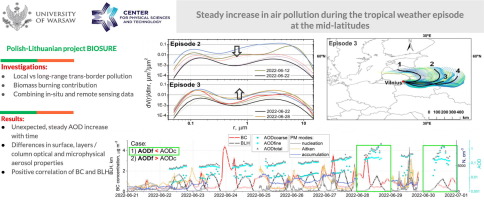Publication
Synergic use of in-situ and remote sensing techniques for comprehensive characterization of aerosol optical and microphysical properties |
Davulienė L., Janicka L., Minderytė A., Kalinauskaitė A., Poczta P., Karasewicz M., Hafiz A., Pashneva D., Dudoitis V., Kandrotaitė K., Valiulis D., Böckmann C., Schüttemeyer D., Stachlewska I.S., Byčenkienė S. |
Science of The Total Environment906, 2024, art. 167585, 10.1016/j.scitotenv.2023.167585 |
We report on importance of conducting comprehensive studies of atmospheric aerosol particles, which cannot be done if information from various complementary sensors is unavailable. We present an example for such application and recommend on the types of sensors that should be used in view of the ACTRIS and RI-URBANS new strategies for monitoring at supersites. Although active and passive remote sensing data was not available in continuous mode, we show that synergic use of them with in-situ observations allows for comprehensive study of temporal and height-resolved distribution of aerosol in the lower troposphere and it can be successfully combined to assess biomass burning impact on air quality and optical properties.
The analysed period was divided into three episodes based on the measured black carbon (BC) concentration and the prevailing wind direction. The dominant 72-h backward trajectories were ending in western Europe, mid-Atlantic and western Russia, respectively, The in-situ measured mass concentrations of BCtotal and BC apportioned to biomass burning as well as particulate matter (PM) concentrations in accumulation mode were twice higher during the first and last episodes compared to the second episode, representing long-range transport from different source regions. The obtained complementary surface, column-integrated, and layer-derived size distributions and other parameters demonstrate the added value of multisensor analyses.

